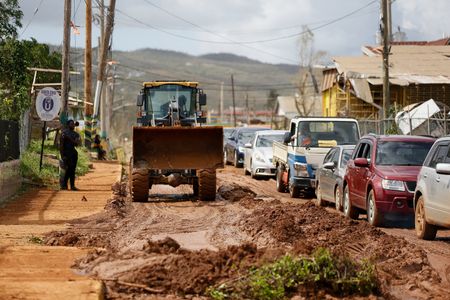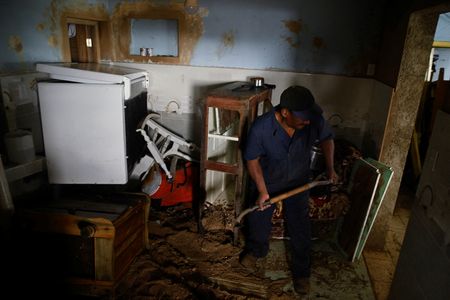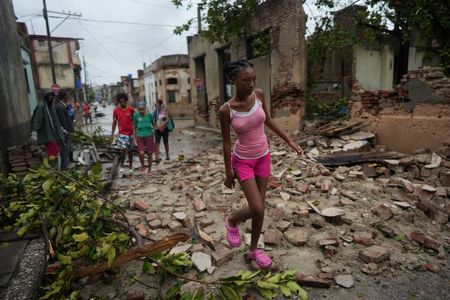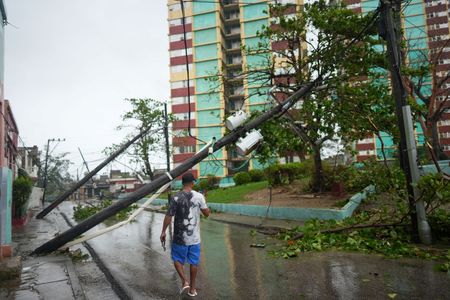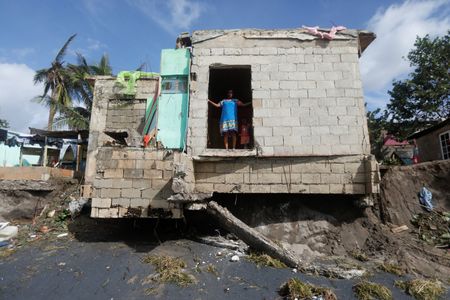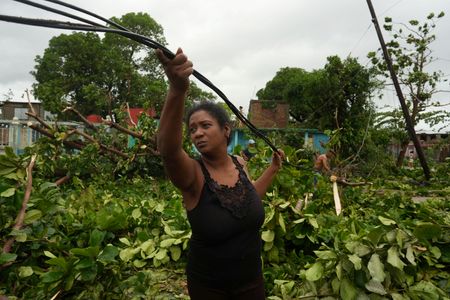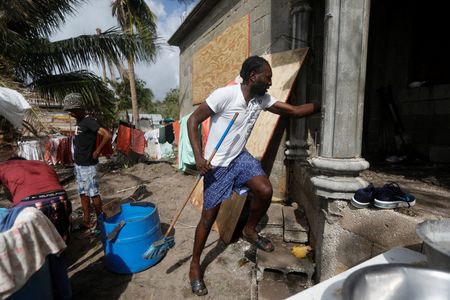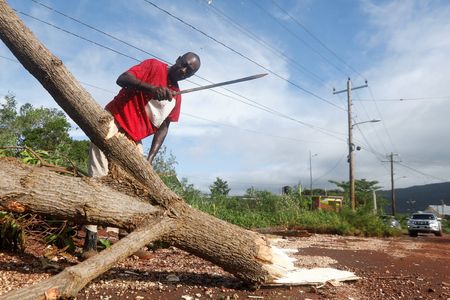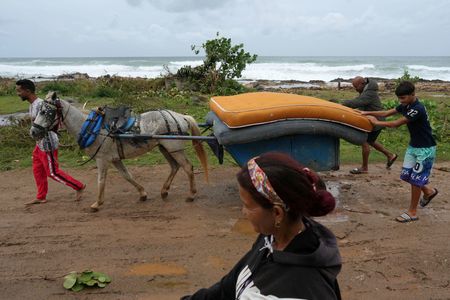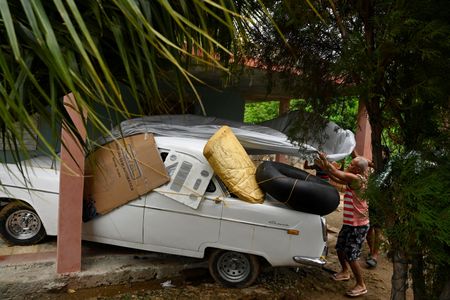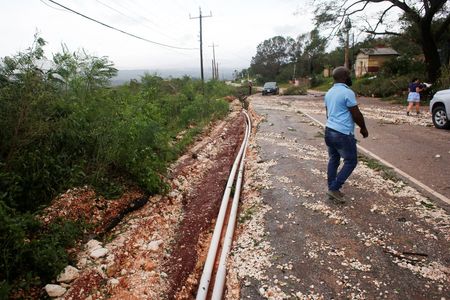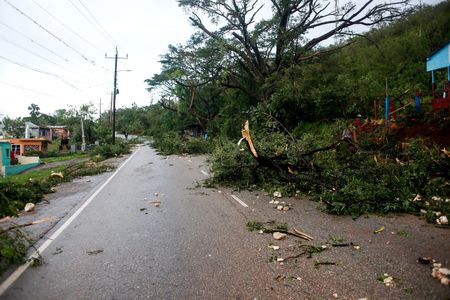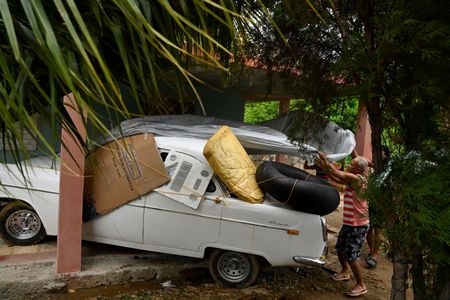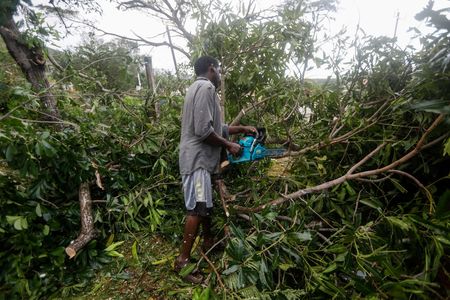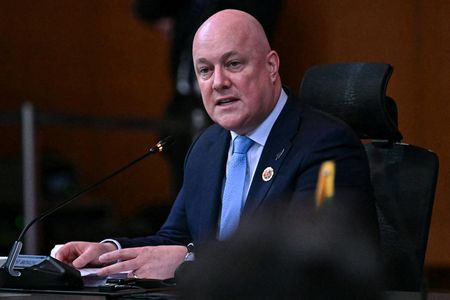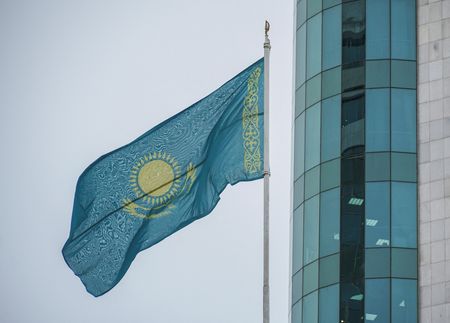By Dave Sherwood
PORT-AU-PRINCE/KINGSTON/HAVANA (Reuters) -Hurricane Melissa barreled through the northern Caribbean on Wednesday after thrashing Cuba’s second-biggest city, isolating hundreds of rural communities, unleashing devastation in Jamaica and drenching Haiti, where at least 25 were killed.
Melissa struck Jamaica on Tuesday as the strongest-ever hurricane to directly hit its shores, with sustained winds of 185 mph (298 kph), well above the minimum strength for a Category 5, the strongest classification for hurricanes.
As of 8 p.m. (0000 GMT), Melissa was a Category 1 hurricane bringing wind, rain and storm surges as it moved north-east through the Bahamas archipelago, whose government earlier flew out nearly 1,500 people in what it called one of its largest evacuation operations.
Residents in the Bahamas and nearby Turks and Caicos hunkered down, while some 895 miles (1,440 km) north-east Bermudans prepared for hurricane conditions forecast from Thursday.
U.S. forecaster AccuWeather said Melissa was the Caribbean’s third-most intense recorded hurricane, as well as its slowest-moving, which made it particularly destructive.
The storm did not directly hit Haiti, the Caribbean’s most populous nation, but lashed it with days of rain. Authorities reported at least 25 deaths, largely due to floods in Petit-Goave, a coastal town 64 km (40 miles) west of the capital where a river burst its banks.
At least 10 children were killed and 12 people remain missing there, Haiti’s disaster management agency said, adding that nationwide more than 1,000 homes have been flooded and nearly 12,000 people moved into emergency shelters.
An extended gang conflict has impoverished Haiti and displaced over 1.3 million. People living in makeshift camps said the flooding made it impossible to sit or sleep, and that the government and aid groups were slow to bring supplies.
Fortune Vital, a displaced man in Les Cayes, said he was separated from his family which already lacked sufficient food. “If the hurricane comes on top of all the problems we already have, we’ll simply die,” he said.
‘LIKE MISSILES BLOWING THROUGH THE GLASS’
In Jamaica, AccuWeather estimated Melissa could cost $22 billion in damages and economic loss and that rebuilding could take a decade or more.
The capital Kingston was spared the worst damage and its main airport was set to reopen Thursday, but as of Wednesday morning authorities said about 77% of Jamaica was without electricity.
Melissa made landfall in southwestern Jamaica on Tuesday, devastating areas already battered by last year’s Hurricane Beryl. Local authorities said flood waters had washed up four bodies in the agricultural hub of St. Elizabeth.
Prime Minister Andrew Holness visited Black River Hospital, the only public hospital in St. Elizabeth, where aerial footage showed the wrecks of buildings, roofs blown off, power cables knocked down and fields strewn with rubble.
Workers there told the prime minister they spent the night fearing for their own families while working by flashlight to care for patients.
“It was the most terrifying experience in all my life,” a hospital worker said. “It is beyond imagining. At one point it was as if missiles were blowing through the glass.”
Jamaica’s government gave an “all clear” to begin recovery efforts, but said it would keep emergency shelters open through the week as people kept coming in from devastated homes.
Local government minister Desmond McKenzie said over 25,000 people had been admitted. “No one must be turned back from the shelters,” he said.
MASS EVACUATIONS IN CUBA
Melissa was a still major Category 3 when it hit Cuba overnight with winds of 120 mph, landing in rural, mountainous Guama, some 25 miles (40 km) west of Santiago de Cuba, the island’s second-most populous city.
At least 241 communities remained isolated and without communications on Wednesday following the storm’s passage across Santiago province, according to preliminary media reports, affecting as many as 140,000 residents.
Across eastern Cuba, authorities evacuated around 735,000 people as the storm approached.
No deaths were reported on Wednesday but President Miguel Diaz-Canel said the island had suffered extensive damage and warned of vigilance as rains continue to lash the region.
“A major hurricane landfall in the dark is incredibly dangerous,” AccuWeather lead hurricane expert Alex DaSilva said.
“The storm lost wind intensity as it interacted with the mountains of southeast Cuba, but the forced upward motion of the air over the mountainous terrain is squeezing out tremendous amounts of rainfall.”
Cuban officials also warned of severe impact on crops ahead of the Northern Hemisphere’s winter growing season.
Cuba was already suffering from food, fuel, electricity and medicine shortages that have complicated life, prompting record-breaking emigration since 2021.
On Wednesday, the U.N. General Assembly again voted overwhelmingly for the U.S. to end its Cold War-era economic embargo on the communist-run country.
LOSS AND DAMAGE
Scientists say hurricanes are intensifying faster with greater frequency as a result of warming ocean waters caused by greenhouse gas emissions. Many Caribbean leaders have called on wealthy, heavy-polluting nations to provide reparations in the form of aid or debt relief.
The Caribbean Community Climate Change Centre, a branch of regional bloc CARICOM, issued a statement in solidarity of those affected by Hurricane Melissa and called for stronger efforts to curb climate change.
It said Melissa’s rapid intensification, fueled by record-breaking Caribbean sea temperatures, underscored need for the U.N.’s “loss and damage” fund to be scaled up.
The fund was established in 2023 as a mechanism for developing nations to quickly and reliably access financing to recover from more frequent extreme weather events. However, donations from wealthy, polluting nations have fallen short of targets and the U.S. withdrew from its board in March.
The devastation caused by Melissa drew an outpouring of support from across the world, with some countries pledging support in the form of cash, food aid and rescue teams.
In Montego Bay, a popular Jamaican tourist destination, a resident told Reuters the water reached her waist and rescuers had to break into her home to save her and her child.
“All the trees that my dad planted, all of them are gone,” she said.
(Reporting by Sarah Morland and Brendan O’Boyle in Mexico City, Steven Aristil in Port-au-Prince, Herbert Villarraga in Les Cayes, Dave Sherwood in Havana, Zahra Burton in Kingston and Maria Alejandra Cardona in Montego BayEditing by Andrew Heavens, Peter Graff, Matthew Lewis and David Gregorio)

